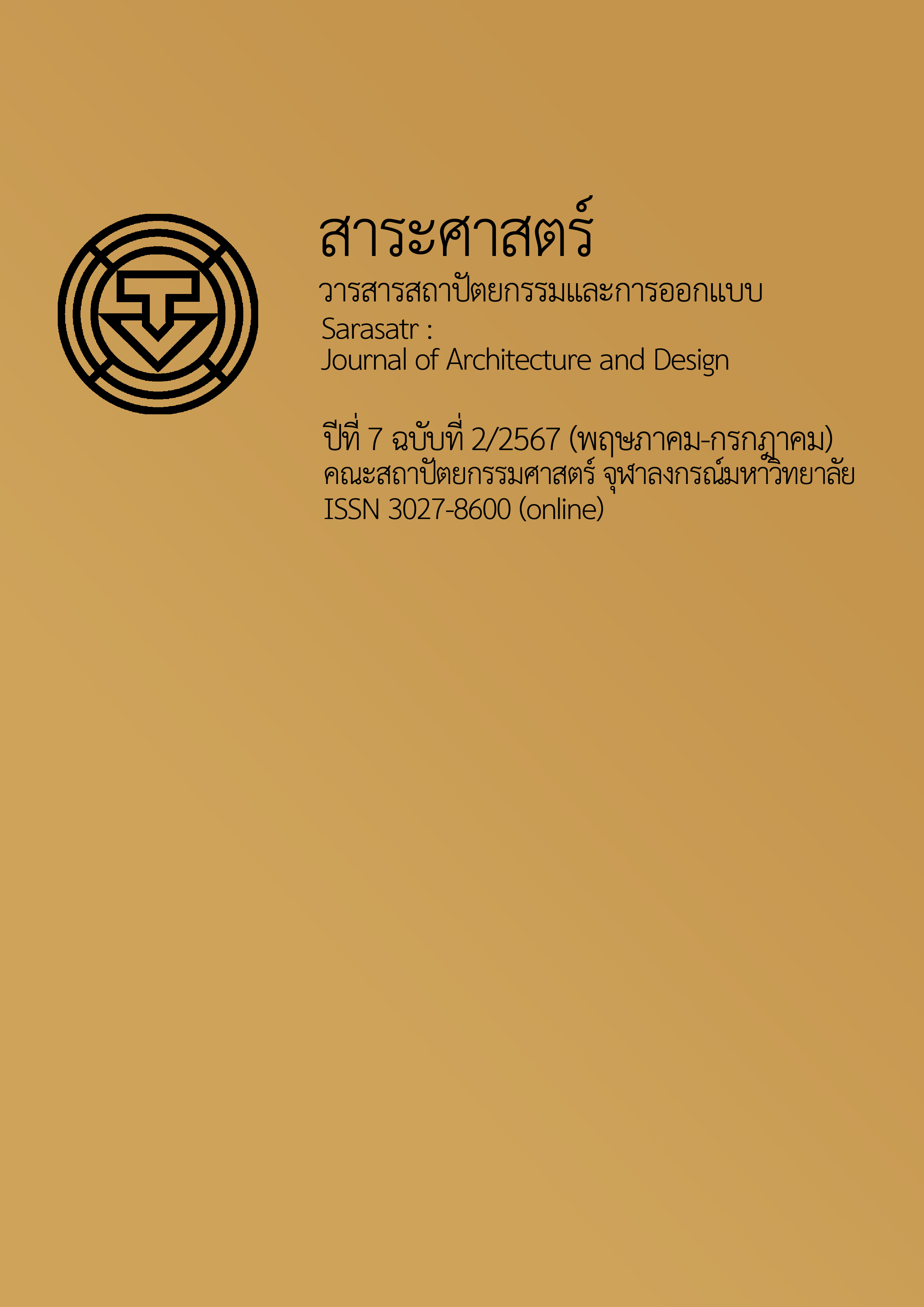Guidelines for Housing Loans Accessibility for Self-employed Persons Living in Bangkok Metropolitan Area
Main Article Content
Abstract
Self-employed persons often encounter difficulties in accessing mortgage loans due to their unstable income and unclear income sources. This research aims to study the mortgage loan considerations used by financial institutions for self-employed persons, along with the self-employed social characteristics and economic backgrounds, the level of mortgage loans knowledge, and the barriers they face in obtaining loans, in order to propose appropriate guidelines for self-employed persons to access mortgages. Data for the study was collected through a questionnaire survey involving 400 self-employed persons in Bangkok metropolitan areas and interviews with mortgage experts from six financial institutions.
The study found that financial institutions use similar criteria for considering loans to self-employed persons and fixed-income persons, yet different income calculation methods, considering only 50% of net income accounted for base income for self-employed, This makes the ability to repay and credit limits of self-employed persons lower than fixed-income persons. The financial institutions also focus on income evidence and tax payment report consistent with bank account transactions. In the questionnaire survey, 74% were in the age between 20-35 years old, 47% were merchants or entrepreneurs, Researchers divided the respondents into two groups.
First, the persons with no inexperience in applying for housing loan, accounted for 65% of the total respondents. The people in this group mostly have incomes between 10,000-20,000 baht, and personal expenses below 10,000 baht, They are often facing obstacles due to lack of document preparation and inconsistent income. Second, the persons with experience in mortgage application accounted for 35% of the total respondents, The people in this group mostly have incomes between 30,000-50,000 baht and personal expenses between 10,000-20,000 baht, The results of loan applications reveal that 70% of them were approved because they had prepared proper documents and regularly deposited income into their bank accounts. However, 27% of them were denied due to insufficient income and lack of required documents.
The research indicates that in order to increase opportunities for accessing housing loans, applicants should be financially prepared, with debt burden of less than one-third of their income, down payment at least 20% of the house price and suitable house prices for their income. Additionally, they should be supported with knowledge in financial planning and document preparation. This will be beneficial guidance for interested persons to prepare themselves before applying for a housing loan and for financial institutions to design housing sales support products suitable for self-employed persons.
Article Details
References
กรุงเทพธุรกิจ. (2566). อสังหาฯ แก้เกมรีเจ็กต์พุ่งแค่ยืดเวลาไม่พอต้องปล่อยกู้ผ่าน Non-bank. https://www.bangkokbiznews.com/property/1066154
ชุดาภา ผิวเผือก. (2562). ปัจจัยที่ใช้ในการวิเคราะห์สินเชื่อของธนาคารพาณิชย์ในประเทศไทย [วิทยานิพนธ์ปริญญามหาบัณฑิต ไม่ได้ตีพิมพ์]. มหาวิทยาลัยธุรกิจบัณฑิตย์.
ธนาคารแห่งประเทศไทย. (2566). สิ่งที่ควรรู้เมื่อขอกู้เงิน. https://www.bot.or.th/th/satang-story/managing-debt/before-loan.html
พัชญา โพธิรัตน์สมบัติ. (2563). ปัจจัยการปฏิเสธสินเชื่อเพื่อที่อยู่อาศัยของลูกค้าบริษัทพัฒนาอสังหาริมทรัพย์ ประเภทที่อยู่อาศัย : กรณีศึกษา บริษัท เอ็น.ซี. เฮ้าส์ซิ่ง จำกัด (มหาชน) และ บริษัท ออริจิ้นพร็อพเพอร์ตี้ จำกัด (มหาชน) [วิทยานิพนธ์ปริญญามหาบัณฑิต ไม่ได้ตีพิมพ์]. จุฬาลงกรณ์มหาวิทยาลัย.
พัลลภ กฤตยานวัช. (2544, มกราคม-กุมภาพันธ์). การวางแผนการเงินในการซื้อบ้าน. RE Journal, 18.
พิจิตรา ก้องกิตติงาม. (2558). การวางแผนทางการเงินเพื่อที่อยู่อาศัยของบัณฑิตจบใหม่จากจุฬาลงกรณ์มหาวิทยาลัย [วิทยานิพนธ์ปริญญามหาบัณฑิต ไม่ได้ตีพิมพ์]. จุฬาลงกรณ์มหาวิทยาลัย.
พิมพ์ธัญญา ฆ้องเสนาะ. (2566). Gig economy ระบบเศรษฐกิจใหม่กับวิถีการทำงานของคนรุ่นใหม่ที่ไม่เหมือนเดิม. https://www.parliament.go.th/ewtadmin/ewt/parliament_parcy/ewt_dl_link.php?nid=49247
ศูนย์ข้อมูลอสังหาริมทรัพย์. (2566). เงินเฟ้อ-ดบ.พุ่งกดกำลังซื้อ แบงก์เข้มยอดปฏิเสธสินเชื่อกระฉูด อสังหาฯ แก้เกมดึง Nonbank ทำเช่าซื้อ. https://reic.or.th/News/RealEstate/467373
สหธร เพชรวิโรจน์ชัย. (2564). Gig Economy คืออะไร กระทบกับบทบาทของ HR อย่างไร. https://th.hrnote.asia/tips/210917-how-gig-economy-impact-hr/
สำนักงานสถิติแห่งชาติ. (2565). รายงานการสำรวจแรงงานนอกระบบ พ.ศ. 2565. สำนักงานสถิติแห่งชาติ กระทรวงดิจิทัลเพื่อเศรษฐกิจและสังคม. https://www.nso.go.th/sites/2014/DocLib13/ด้านสังคม/สาขาแรงงาน/Informal_work_force/2565/summary_65.pdf
สุกฤช พงศ์พันธุ์พณิชย์. (2564). ความต้องการสินเชื่อเพื่อที่อยู่อาศัยของผู้ประกอบอาชีพอิสระในจังหวัดปทุมธานี. The Journal of Pacific Institute of Management Science (Humanities and Social Science), 8(2), 661-672.
Spider Hr. (2566). แรงงานนอกระบบคือใคร. https://spiderhrm.com/แรงงานนอกระบบ-คือใคร
Fannie Mae. (2024). Homeownership education. https://www.fanniemae.com/education
Kalinowski, Victor. (2021). Self-employed home loan 2021 complete guide. https://www.blackk.com.au/self-employed-home-loans/
Yamane, Taro. (1973). Statistics: An introductory analysis (3rd Ed). Harper and Row.


